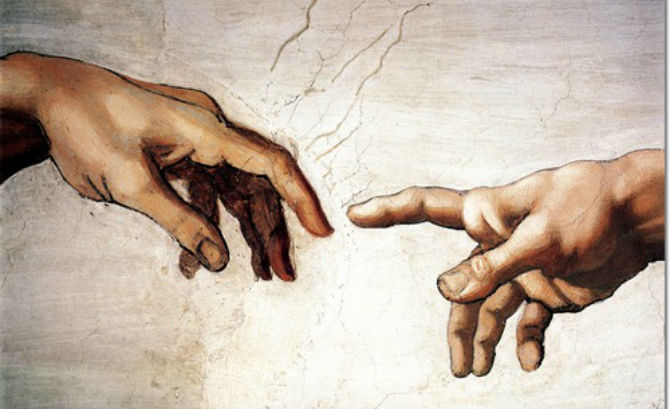
Searching for Our Humanity in the Doing of Theology
July 9, 2020 Roland Kuhl 0 Comments
Often we think that when we engage in doing theology that we are engaging in an endeavor that requires us to take our eyes off of ourselves and gaze toward the heavens to get a glimpse of God, to understand God in some way, to elevate ourselves somehow towards a higher plane of existence of experience that embraces God.
Most religions have this kind of focus in which we seek to free ourselves from our human condition, to experience enlightenment, nirvana, perfection, divinity, to be more than human. We look to religion, we engage in doing theology, to perhaps not to escape our humanity, but to transcend what it means to be human, to be something more than we are, to release us from what holds us grounded to the earth, our limitations, our frailty, our failings, in order to be set free from all that limits us. We seek to empty ourselves of our limitations, so that we might be open to all that releases us and sets us free what holds us, like gravity, to our earthly existence. Our views of such take on perspectives of heaven far away, being one with the universe, being free of our human limitations.
But I think we have got it all wrong. If religion seeks us to set us free from what it means to be human, then it deceives and distorts. It is not ultimately about life, and fully embracing what it means to live abundantly as human beings.
But what if merely thinking about God is not the agenda for theology? What if our thinking about God is indeed not to escape our humanity, but to rather drill down deep in what it means for us to be human, to become more deeply human and humane, to become more grounded in our finiteness, not to transcend our humanity, but to become more completely human, grounded in what it means to be human.
In my teaching an undergraduate theology course I suggest that what we really are engaging in when we do theology is to explore ourselves, our questions, exploring what it means for us to be human in light of our brokenness as human beings. We are to engage in the doing of theology not for the sake of somehow discovering who we are that we can loose ourselves from the ties of our humanity and become more god-like (free from sin, free from our limitations, free from this life), but to ground ourselves in our humanity to strengthen and deepen our understanding of who we are and how we are to be (which reframes what we understand by sin and why it is important to be liberated from it so that we may indeed to able to embrace a fullness of life as human beings).
I have come to discover that the focus of the biblical story and vision is just this – we engage Scripture not to discover God and escape our humanity, but we engage Scripture to discover God who sees us, the encounter between God and humanity, the mutual responding of God and humanity, and through this encounter for us to embrace and become more completely what we were created to be: human beings.
We do theology to understand and fully embrace our humanity.
We think about God so that we might fully embrace our being human.
As I read Anderson this summer (and beyond), he gave significant focus to exploring what it means to be human through his work On Being Human: Essays in Theological Anthropology (Eerdmans, 1982). Though I will likely not engage in a full exploration on Anderson, I will draw upon him as I explore my own musings on theology and humanity here in future posts.
As Christian Kettler summarizes Anderson, I am, however, indebted to Anderson for shaping my thinking in this direction.
“The Christian revelation is not only the revelation of God but also the revelation of what it means to be human. Grace is needed to reveal the true order of humanity. Otherwise, the ‘cure’ in the case of much of religious excess, can end up destroying humanity. The sad history of religion, including Christianity, is a powerful testimony to that. The critique of religion by Karl Barth and Dietrich Bonhoeffer was aimed at exposing the insidiousness of its force and destructiveness towards humanity. . . . ‘The point here is that a theological anthropology dares to begin with humanity because it can find in the humanity of Jesus Christ the true order of humanity and the true nature of sin as the source of disorder and destructiveness’” (Kettler, Reading Ray Anderson, 29; also, Kettler citing Anderson, On Being Human, 17)
And so, I would like to explore more this connection between doing theology, God and our being human over the next few months – you can find my musings here in these posts.